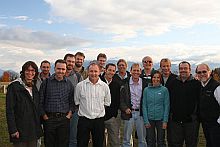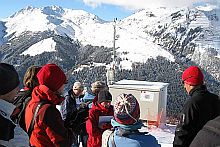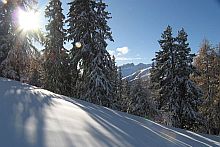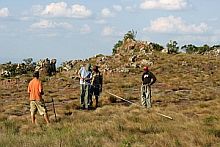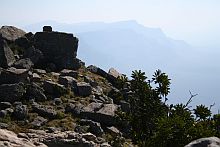SAEON Ndlovu - 'Proudly South African' in the Swiss Alps
|
Dr Dave Thompson, Biodiversity Scientist and Dr Tony Swemmer, Manager, SAEON Ndlovu Node
Global change is already affecting the mountainous regions of the world, with clear evidence of altered weather patterns and the upslope shift of alpine species.
Yet in South Africa, little long-term environmental monitoring of our mountains is taking place, and this is something which is desperately needed if we are to detect and respond to the looming impacts of a changed climate. This is in contrast to many northern hemisphere first-world countries, which have long histories of detailed environmental monitoring. Of these, Switzerland stands out as the global leader.
Ecological monitoring in Swiss Alps
In November last year Tony Swemmer and Dave Thompson of the SAEON Ndlovu Node visited Switzerland to learn about the ecological monitoring being conducted in the Swiss Alps. The trip was made possible by funding for a Swiss-South African Joint Scientific Conference entitled “Towards Fine Resolution Hydro-Ecological Observatories in South African Mountains” and was initiated specifically to promote international collaboration, knowledge transfer and the establishment of a network of permanent environmental observatories in southern African mountains.
The programme covered observing systems related to climate, the atmosphere, hydrology and biodiversity, and took place at the Swiss National Park (Zernez), the Swiss Federal Institute for Forest, Snow and Landscape Research (Davos), the Federal Office for the Environment (Bern) and the University of Lausanne.
Together with the other South African participants (from the Universities of Pretoria, Witwatersrand, KwaZulu-Natal and Stellenbosch, Ezemvelo KZN Wildlife and private nature reserves), Tony and Dave were absorbed in discussions and institute / monitoring site visits led by colleagues from the Swiss National Park, MeteoSwiss (the Swiss weather service), the Swiss GCOS Programme, the Swiss Phenology Network, the WSL (the Swiss Federal Institute for Forest, Snow and Landscape Research), SwissEx (a group developing sensor networks within the WSL), the Hydrology Division of the Federal Office for the Environment, the Swiss Biodiversity Monitoring Program, GMBA (Global Mountain Biodiversity Assessment), MIREN (Mountain Invasion Research Network) and GLORIA (Global Observation Research Initiative in Alpine Environments).
In return, the South African contingent shared information and challenges relating to current hydro-ecological monitoring efforts taking place in South African mountains. To view the presentations visit http://mri.scnatweb.ch/events/mri-events.
Future collaborations
After defining topics of common interest between South African and Swiss scientists, participants identified the following obvious collaborations which, at the international scale of data collection and analysis, will contribute towards new perspectives in our understanding of global change.
-
Coordinated monitoring (in line with the SwissEx / GLORIA approach) at selected permanent mountain sites within South Africa will provide for altitudinal and latitudinal comparisons locally. Furthermore, this will serve as a valuable drier-warmer mountain contrast to the temperate-humid mountains of the Alps. There is also a strong educational component planned, including tertiary level field-based research training courses at each site. SAEON Ndlovu will play a key role in this, with monitoring already taking place in the Soutpansberg and the Limpopo Escarpment, and with further monitoring planned for later this year at Mariepskop in Mpumalanga (in conjunction with University of Pretoria).
-
Invasive species monitoring in South African mountains along altitudinal gradients could be compared with world-wide data collected by the Mountain Invasion Research Network, and could also be used for within-South Africa comparisons. The applicability of the MIREN methodology in the southern African context is of relevance to SAEON given both the current and likely future threat posed by exotic species under the global change scenario.
-
Vegetation communities, and overall biodiversity, are strongly influenced by the availability of water and variation in temperature, both of which can vary abruptly over short distances in mountains. Observations are not always available at the spatial scale of these variations and the development of a fine resolution atmospheric model (planned for Mariepskop through the efforts of the University of Pretoria and the Swiss Federal Institute for Forest, Snow and Landscape Research) will generate data fields that can be used to study spatial changes in vegetation structure. SAEON Ndlovu will play a vital role in assisting with the monitoring of plant communities.
-
The establishment of permanent, common observation sites provides an opportunity for the development of an integrated environmental data platform specific to mountain research. SwissEx and the Global Mountain Biodiversity Assessment have open access environmental data platforms that allow common acquisition technologies to be shared and which encourage data sharing and preservation of knowledge. Inclusion of SAEON as a website and on-line data platform provider would not only help achieve SAEON objectives locally, but would also provide valuable support to international partners.
Showcasing South Africa’s environmental assets
After a week we returned to South Africa with a detailed understanding of the technologies and mechanisms applicable to ground-based environmental monitoring in mountains, an appreciation for the budget and staff constraints facing local research institutes, and with tired brains full of ideas for the future.
Funding is required to move forward on the possible collaborations earmarked during the conference and we met with many new potential partners for writing proposals - both among the Swiss and the South African contingents. To help solidify these partnerships and further catalyse international collaboration between scientists from the two countries, a reciprocal conference is already being planned.
This will give SAEON Ndlovu the opportunity to showcase our environmental assets and illustrate to our Swiss colleagues how we do things – South African style.
Related content: SAEON plays vital role in monitoring SA’s premier water engine


